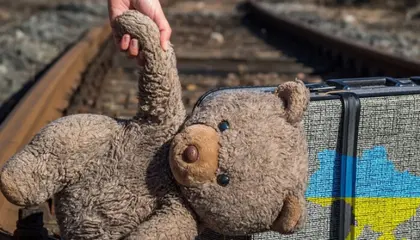Russia’s genocidal agenda against Ukrainians was further exposed with new reports released by human rights organizations about the abduction of children and the execution of civilians.
Ukraine’s Ombudsman and Parliamentary Commissioner for Human Rights, Dmytro Lubinets, reported at a Kyiv conference yesterday on the violation of the rights of Ukrainian children in temporarily occupied territories and Russia including their deportation, militarization, and indoctrination.
JOIN US ON TELEGRAM
Follow our coverage of the war on the @Kyivpost_official.
Lubinets said his office has identified at least 380 children who have been forcibly transferred to Russian families, and the locations of abducted Ukrainian children in 57 regions of Russia.
“Cases of abduction of children by the Russian military in the temporarily occupied territories for the purpose of intimidation, pressure on relatives, and intelligence data collection were also recorded,” Lubinets said.
As reported by Ukrinform, the Ombudsman cited data from law enforcement agencies that the Russian Federation manipulates and exploits minors in war activities as spies and military fire spotters, and actors in propaganda videos.
According to Lubinets, many tools are used to “recruit” Ukrainian children, including so-called vacations at “military-patriotic camps” and membership in young militias and movements.
“There are a lot of them. They differ in name and are launched in... different parts of the Russian Federation, but all have the same characteristics. Their goal is the maximum involvement of Ukrainian children in so-called patriotic movements and the popularization of the Russian army,” Lubinets said.

Zelensky Meets CIA Director William Burns in Ukraine
The Ombudsman told the conference that, according to the Unified Register of Pretrial Investigations, five criminal proceedings have been registered to investigate the exploitation of minors in the war since the beginning of the full-scale Russian invasion of Ukraine.
Approximately 100 Ukrainian children per day are abducted to so-called “re-education” camps, Kateryna Rashevska, a lawyer with the Regional Center for Human Rights, told the conference.
“That’s why the number of children [abducted by the Russian Federation] is increasing, and Russia does not want to return them,” she said.
According to Ukraine’s National Information Bureau, more than 16,000 children have been taken to Russia or Russian-controlled territory since the invasion last February. As reported by the journal Foreign Policy, Moscow claims any children now under its watch were either orphans or had requested evacuation, “but Kyiv warns of a far more sinister plot: generational genocide, an attempt to erase Ukraine’s identity by stealing its future.”
In another report released yesterday, the Office of the United Nations High Commissioner for Human Rights (OHCHR) said that Russia has summarily executed at least 77 civilian detainees since its full-scale invasion of Ukraine.

UN monitors have documented the summary execution of 72 men and five women whom the Russians arbitrarily detained in Ukraine.
The real number of extrajudicial executions carried out by Russia since it began its full-scale invasion of Ukraine is undoubtedly much higher as the fate of many victims of enforced disappearances remains unknown, and the above figure does not include those whom the Russians executed on the spot.
The report is based on information gathered by OHCHR through 274 site visits, including 70 visits to official detention facilities, and through interviews with 1,136 conflict-related detainees, their relatives, witnesses of violations, lawyers, human rights defenders and public officials in local communities.
864 individual victims of arbitrary detention were documented with these including two boys (as well as 94 women and 763 men). The OHCHR authors note that many of these cases amounted to enforced disappearances, including some of the many cases where civilians were detained during the so-called process of “filtration.”
OHCHR writes that filtration is used “to identify possible affiliation with or support for the Ukrainian armed forces or authorities, and to collect information about residents in occupied territory.”
In 260 cases, civilians were taken prisoner because of “their perceived political views or other legitimate exercise of freedom of expression.”
Ninety-one percent of the civilian detainees whose cases OHCHR documented said that they had been subjected to torture or ill-treatment, with this sometimes including sexual violence.
The OHCHR also examined abuses by Ukrainian authorities. It documented 75 cases (57 men, 17 women and one boy) of arbitrary detention by Ukrainian security forces, mostly of persons suspected of conflict-related criminal offences.
You can also highlight the text and press Ctrl + Enter






